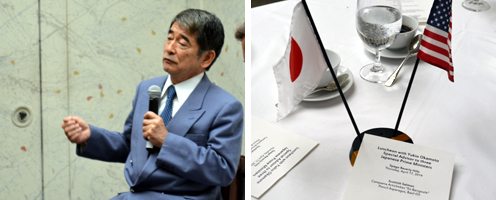
The chances of an inadvertent war between Japan and China over the Senkaku Islands, which the Chinese call the Diaoyu Islands, are already high, and will continue to increase, predicted Japanese foreign policy expert Yukio Okamoto at a roundtable lunch with the LA World Affairs Council on Thursday. Okamoto, a former Japanese diplomat who runs a political consultancy and is also a fellow at MIT in Cambridge, said that not only was China in general becoming more nationalistic, but the Chinese Navy really wants to control the uninhabited islands to give it free access to the Pacific.
“This issue will get more serious – China will not yield an inch,” said Okamoto. He said that since the 1980’s China’s navy has had a two-phase policy. The first phase is for Chinese naval power to control all waters out to “the first chain of islands” – from the west coast of Japan down past the Philippines to Borneo. The second phase is to control the “second island chain” that is further out, stretching from the east coast of Japan down through Iwo Jima, Saipan and Guam to Papua New Guinea. The overall aim, said Mr Okamoto, was to keep the US Navy away from the Chinese coastline. “This changes the significance of the Senkaku Islands – if the Chinese can gain those islands and build military facilities there, it gives them a gateway to the Pacific.”
Okamoto echoed a comment made by Elizabeth Economy from the Council on Foreign Relations, who talked to a LAWAC roundtable last week – young Chinese naval officers, more nationalistic and potentially hot-headed, could start a shooting match that could have very serious consequences. “Should a single Chinese sailor be killed by Japanese forces, there would be a pseudo-war against Japan across China, with Japanese companies and factories attacked…. If one Japanese were to be killed by Chinese forces, it would be the first Japanese military casualty since 1945, and it would ignite the [Japanese] population to swing to the right.”
On Japan’s attempt to revive its economy, Okamoto said that the prime minster, Shinzo Abe, has had some success with his “Abenomics” – the stock market is up 40% since he took power 16 months ago, and companies are investing more. But at the same time Japan is facing an enormous increase in its energy bill, as all 54 nuclear reactors in the country have been shut down after the Fukushima disaster, and so Japan is importing much more oil to compensate. “The current account surplus is disappearing.” One bright spot, he said, was Japan’s winning the right to stage the 2020 Olympic Games. “Japan is not good at setting goals, but we are very good at implementing once a goal is set. The 2020 Olympics are a good goal, and will involve a lot of investment – the Japanese economy will look a lot better in 2020 than it does now.” He also voiced support for the ongoing TPP trade talks between the US and Pacific Rim nations including Japan. He said this would be a good opportunity for Japan to modernize its own antiquated agriculture system. The average age of Japanese farmers is now 67, and "getting older every year."
He also was not hopeful about any reconciliation with North Korea, pointing out that when Kim Jong Il died, “eight people walked with his coffin. One was [current leader] Kim Jong Un. Five others have already been executed or purged. We cannot rely on Kim Jong Un to do a peace deal with Japan.” He predicted North Korea would not stop testing nuclear weapons and missiles until it had a nuclear missile that could reach the continental United States. “Only then will they feel they have some leverage.” To counter that, Okamoto said, the US and Japan should continue developing anti-missile defense systems to let the North Koreans know their military plans cannot work.
